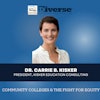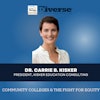In this episode, Diverse host David Pluviose welcomes two distinguished guests, Dr. Alonzo Plough and Dr. Thomas LaVeist. Plough is vice president of Research-Evaluation-Learning and chief science officer for the Robert Wood Johnson Foundation. LaVeist is dean of the School of Public Health and Tropical Medicine at Tulane University and chair-elect of the Association of Schools and Programs of Public Health (ASPPH).
Plough and LaVeist share the challenges universities face, particularly in their efforts to foster diversity and inclusion. They discuss the impact of COVID-19 on health disparities and the valuable lessons learned from the pandemic. LaVeist stresses the influence of social factors and racial segregation on health inequalities, while Plough highlights the importance of addressing inequity in public health practice and academia. They also explore their involvement in the recently established program, Transforming Academia for Equity, and shed light on large-scale initiatives, such as those led by ASPPH, that aim to transform institutions.
This episode serves as a call to action, urging institutions to engage with these programs and initiatives to contribute to the vital work of closing health equity gaps. So, join the conversation and find out how academia can better serve marginalized communities and tackle health disparities effectively.
KEY POINTS:
- Dr. Thomas LaVeist’s transition to health inequity research
- Dr. Plough’s activist roots and journey to public health
- Social factors and the role of racial segregation in COVID-19 disparities
- Uncovering weaknesses in the U.S. public health system during the pandemic
- The importance of fostering dynamic community partnerships in schools of public health
- The necessity of Equity, Diversity, and Inclusion cultural competency and improving the workforce
- Transforming academia with an equity program and how it can help address inequalities
- Addressing health equity in the face of attacks on DEI
- The importance of diverse leadership in academia
- Developing the next generation of equity-focused leaders
QUOTABLES:
"The social factors, political issues, economic issues, can be as important as biological issues in determining the health of populations." - Dr. Thomas LaVeist
"The COVID-19 outbreak continues to be something that amplifies marginality and unfair health outcomes, and it should’ve been more than a teaching moment."- Dr. Alonzo Plough
GUEST RESOURCES:
Learn about Dr. Thomas LaVeist at https://sph.tulane.edu/hpm/thomas-laveist-phd and Dr. Alonzo Plough at https://www.rwjf.org/en/about-rwjf/staff-and-trustees/staff/p/alonzo-l-plough.html
WATCH THIS VIDEO AND OTHERS ON OUR YOUTUBE CHANNEL:
https://www.youtube.com/@DiverseIssuesInHigherEducation
OR FOLLOW US ON SOCIAL MEDIA:
Twitter: http://twitter.com/diverseissues
Instagram: http://instagram.com/diverseissuesinhighereducation
Facebook: http://facebook.com/DiverseIssuesInHigherEducation/
Linkedin: http://linkedin.com/company/diverse-issues-in-higher-education
Closed captioning and transcription are available in the video for this episode.
In The Margins is produced by Diverse: Issues In Higher Education and edited by Instapodcasts (visit at Instapodcasts.com)














